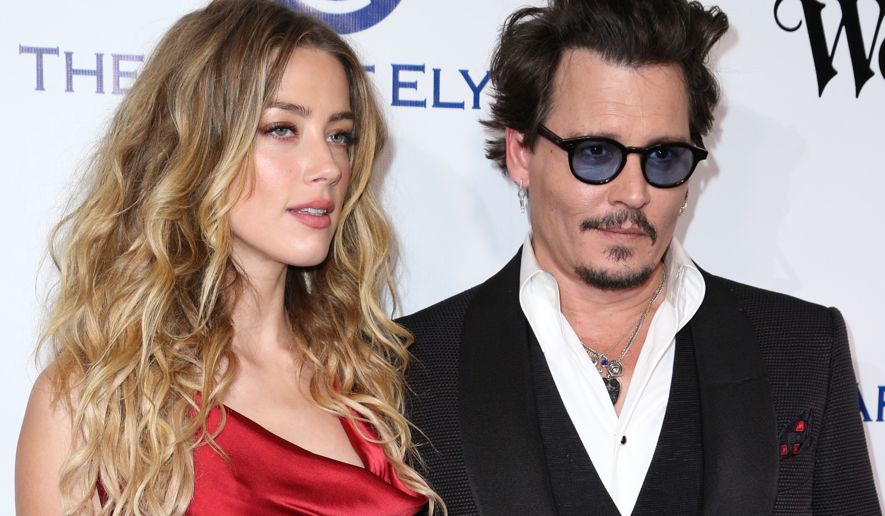The recent divorce announcement by celebrity couple Johnny Depp and Amber Heard has caused quite a stir in the media, as allegations of domestic abuse have surfaced as the principal reason for the split. The media and internet immediately began taking sides. Depp’s exes and daughter tweeted passionate defenses of his character, and close friend John Stanhope penned an open letter accusing Heard of “blackmailing” her husband. Heard claims that Depp verbally and physically abused her multiple times throughout the course of their short marriage. Several of Amber’s friends declared their support for her, defending her claims with witness accounts of the alleged abuse. The judge granted a temporary restraining order against Depp after Amber provided photos in which she sported a bruised cheek and eye, stating that the injuries occurred when Depp threw a cellphone at her face. As the charges grew, news outlets, celebrities, and social media personalities alike insinuated that Amber invented the allegations in order to make money or slander Depp’s name.
Victim blaming is nothing new; it sadly seems to be part and parcel of all domestic abuse cases, including high-profile matters. Amber Heard’s case bears some similarities to the recent court battle between musician Kesha and producer Dr. Luke. Kesha accused her former mentor of repeatedly sexually and verbally abusing her. She sought to escape a contract with Dr. Luke, arguing that she should not have to maintain business ties with a former abuser. Just as Kesha’s supporters defended her with the viral #freekesha hashtag, many media outlets and members of the public wasted no time in vilifying Kesha and dismissing her allegations as nothing but a slanderous attempt to pursue a more lucrative record deal. It is no surprise that Heard has been treated similarly. As a popular actress, she is financially independent and therefore unlikely to need monetary support from Johnny Depp. Furthermore, she has withdrawn her request for spousal support. Both of these factors indicate that money is not her motivation, but the court of public opinion prefers to search for an ulterior motive.
The response to Amber Heard’s claims has been virulent, and the defense somewhat lukewarm in comparison to the outpouring of support Kesha received during her dispute. This is likely due to the relative popularity of Johnny Depp in comparison to Dr. Luke. While Luke is well-known inside certain music-industry circles, Johnny Depp is, of course, an extremely well-loved and talented actor with a long list of accomplishments dating back several decades. From 21 Jump Street to Edward Scissorhands, to Pirates of the Caribbean, he has played many fan-favorite roles, winning multiple awards and accolades in the process. In our celebrity-obsessed culture, this renders Depp virtually beyond reproach. How could Captain Jack Sparrow abuse anyone? After all, he’s an Oscar nominee.
Johnny’s past history of belligerence is either minimized or ignored entirely by his defenders. He is no stranger to drug or alcohol-induced violence and outbursts. Depp has struggled with sobriety for years, and has previously been arrested for assaulting security guards and trashing hotel rooms. He has been implicated in multiple bar-fights, one in which he may have fought with his own bodyguard in a Danish bar, and another wherein Depp and a companion clashed with a man who accidentally picked up Depp’s drink. The gist of his friends’ and fans’ defense boils down to the assertion that such a nice low-key guy would never do something violent. They overlook the fact that he HAS done something violent, on many occasions.
While Depp’s propensity for substance-abuse driven aggression is downplayed, Heard’s evidence of abuse is scrutinized and rebutted. She has multiple photographs displaying bruises and cuts on her face, and sported a battered face shortly after the cellphone incident. She has months of text messages documenting other incidences of abuse, which were authenticated by a forensic technology specialist. A witness who called 9-11 on behalf of Heard has testified in support of Amber’s claims. The door guards at her building reported that they did not see bruises on the day following the phone incident. Many men are unfamiliar with makeup, and often have difficulty distinguishing minimal makeup from no makeup at all, but their testimony is held up as iron-clad evidence that Amber created the bruises herself in a Machiavellian scheme to discredit Johnny Depp. We all know the story of Adam and Eve. The trope of women as vindictive harpies at heart is one that has pervaded our cultural fabric since the dawn of time. It’s no surprise that people are more comfortable with this concept than with the possibility that their favorite movie stars may not be as genial as the characters they portray on screen.
This court battle is still ongoing; only time and evidence will tell whether the allegations are true, and to what extent. No matter the outcome of the case, we can bet that Amber Heard will continue to face accusations of falsifying claims of abuse for years to come. The sad reality is that our culture of victim-blaming means that women are never taken at their word when reporting abuse, even when the evidence points in their favor. Women from all walks of life face this obstacle, and it is compounded for women who accuse popular celebrities of abuse. They must endure attacks on their character, history, and motives, just as media apologists simultaneously ignore, obfuscate, and minimize the history of the accused. In our society, the accuser is often subjected to more scrutiny than the abuser. This has to change.
 Rachel Eckhardt is an avid political enthusiast, litigation manager, military veteran, and creator of The Illusion of Choice, a blog covering American politics and current events.
Rachel Eckhardt is an avid political enthusiast, litigation manager, military veteran, and creator of The Illusion of Choice, a blog covering American politics and current events.
Follow Rachel on Facebook, or on Twitter at @Rachel_Eckhardt.

